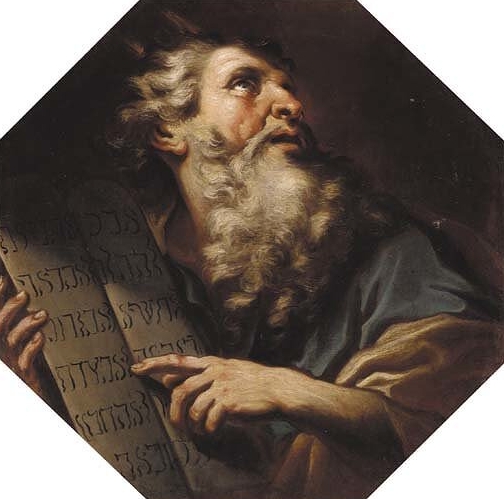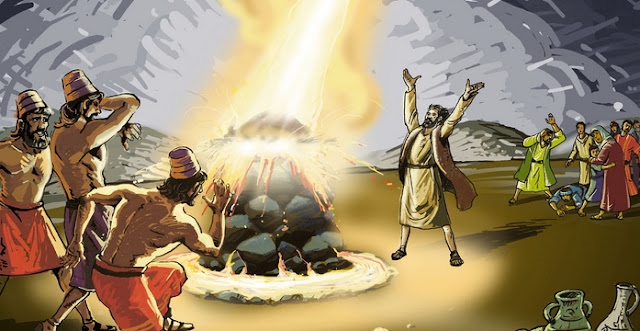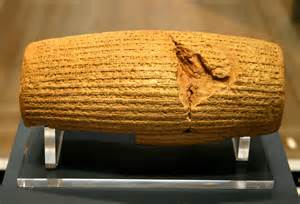
Moses receives the word of God
Who chose the books that make up the Old Testament? How was the Old Testament organized? One way to understand this is by examining four questions.
1. Is the book divinely inspired, a process that includes both the writer and his writing; in essence is the author a man of God?
From the very beginning, the first five books (Pentateuch), were clearly recognized as the very words of God and therefore considered sacred and treated
with deep reverence.
Known the Ark of the Testimony, the Ark of the Covenant contained the two stone tablets of the Ten Commandments. When Moses finished recording "all the
words of the Lord and all the ordinances" (Ex 24:3-4), the Book of the Law was placed in the Ark of the Covenant which was kept in the Tabernacle and
ultimately in the Temple when it was built by Solomon roughly some 450-500 years later.
2. Is the author confirmed by a supernatural act of God?
Because the word from God was for the people of God, prophets following Moses were recognized as God's means for speaking to His people. Their messages
were public and served to teach something to God's people including history; thus, anyone who was the mouthpiece of God had the prophetic gift of inspired
writing which qualified its absolute authority.

The prophet Elijah contending with the
prophets of Baal
A spokesman for God often used characteristic phrases like "and the word of Lord came to the prophet" (2 Sam 24:11; 1 Ki 13:20), "the
Lord said" (Hos 1:2; Amos 7:8), or "thus says the Lord" (Ex 4:22; 32:27). However, these phrases alone did not validate their authority.
God's first prophet, Moses, was given miraculous powers (Ex 4:1-9), which established that he did indeed meet with God and was His messenger. In another
example, God's words through the prophet Elijah was validated by a supernatural event (1 Ki 18).
God tells the nation of Israel that He determines who is a prophet and how they can discern who is genuine: 1) I will put My words in his mouth and he
shall speak all that I command him (Deut 18:18), and 2) he who speaks a word presumptuously in My name which I have not commanded him to speak shall die
(Deut 18:20).
3. Does the author tell the truth about God?
When the prophet reveals the truth of God's word, he does not contradict the revelations by other prophets of God. Because God does not contradict Himself
nor tell anything that is false, any teaching about God that is contrary to what God's people already know is true is rejected.
The initial acceptance of a book by the people to whom it was addressed to influences its authority. The people of God, who were contemporaneous to the
prophet and witnessed any supernatural events validating him and the truth of his words, would be able to know whether he was a genuine man of God.
A book can be considered authoritative when it is accepted by other genuine prophets. For example, a portion of a book may be used as a basis for further
revelation (i.e. Dan 9:1-2). Another example may be a quotation from another prophet such as Isaiah 2:2-4 and Micah 4:1-3.
In the first year of Darius the son of Ahasuerus, of Median descent, who was made king over the kingdom of the Chaldeans—in the first
year of his reign, I, Daniel, observed in the books the number of the years which was revealed as the word of the Lord to Jeremiah the prophet for the
completion of the desolations of Jerusalem, namely, seventy years. (Dan 9:1-2, NASB)

The Cyrus Cylinder records Cyrus' repatriating
captured foreigners to their former lands and
restoring their cults.
4. Does the book come with the power God?
Ezra is often seen as a great example of the prophet scribe with a deep love for God and commitment to serve Him. It is through Ezra's devotion to God
and His word, that Cyrus trusts and freely offers silver and gold to the God of Israel. God's word indicated that God was living and active.
He came to Jerusalem in the fifth month, which was in the seventh year of the king. For on the first of the first month he began
to go up from Babylon; and on the first of the fifth month he came to Jerusalem, because the good hand of his God was upon him. For Ezra had set his heart
to study the law of the Lord and to practice it, and to teach His statutes and ordinances in Israel. Now this is the copy of the decree which King Artaxerxes
gave to Ezra the priest, the scribe, learned in the words of the commandments of the Lord and His statutes to Israel: (Ezra 7:8-11, NASB)
Forasmuch as you are sent by the king and his seven counselors to inquire concerning Judah and Jerusalem according to the law of
your God which is in your hand, and to bring the silver and gold, which the king and his counselors have freely offered to the God of Israel, whose dwelling
is in Jerusalem, with all the silver and gold which you find in the whole province of Babylon, along with the freewill offering of the people and of the
priests, who offered willingly for the house of their God which is in Jerusalem; with this money, therefore, you shall diligently buy bulls, rams and lambs,
with their grain offerings and their drink offerings and offer them on the altar of the house of your God which is in Jerusalem. Whatever seems good to you
and to your brothers to do with the rest of the silver and gold, you may do according to the will of your God. (Ezra 7:14-18, NASB)
Notable in the Old Testament is the continuous history of God's covenant relationship with human beings. Each successive prophet wrote, in many cases,
with a link to another to provide a continuous account of this prophetic history. For example:
Samuel and Kings are linked as a historical unit.
David built there an altar to the Lord and offered burnt offerings and peace offerings. Thus the Lord was moved by prayer for the
land, and the plague was held back from Israel. (2 Sam 24:25, NASB)
Now King David was old, advanced in age; and they covered him with clothes, but he could not keep warm. (1 Ki 1:1, NASB)
The book of Chronicles ends with the same two verses that Ezra-Nehemiah begins with.
Now in the first year of Cyrus king of Persia—in order to fulfill the word of the Lord by the mouth of Jeremiah—the Lord stirred
up the spirit of Cyrus king of Persia, so that he sent a proclamation throughout his kingdom, and also put it in writing, saying, "Thus says Cyrus king of
Persia, 'The Lord, the God of heaven, has given me all the kingdoms of the earth, and He has appointed me to build Him a house in Jerusalem, which is in
Judah. Whoever there is among you of all His people, may the Lord his God be with him, and let him go up!'" (2 Chron 36:22-23, NASB)
Now in the first year of Cyrus king of Persia, in order to fulfill the word of the Lord by the mouth of Jeremiah, the Lord stirred
up the spirit of Cyrus king of Persia, so that he sent a proclamation throughout all his kingdom, and also put it in writing, saying: "Thus says Cyrus king
of Persia, 'The Lord, the God of heaven, has given me all the kingdoms of the earth and He has appointed me to build Him a house in Jerusalem, which is in
Judah. (Ezra 1:1-2, NASB)
Originally the Hebrew Bible (Old Testament), as seen in the Dead Sea Scrolls, was arranged in two divisions, the Law and the Prophets. By
400 A.D., the Hebrew Bible divided further with an additional division called the Writings.
The Hebrew Bible (Tanakh) contains the modern divisions of the Law, the Prophets, and the Writings and contains the Old Testament in 24
books. The Hebrew Bible book titles contrasts sharply with the English version, because it names the books according to their first significant word; the
English book titles were derived from the Greek translation of the rabbinical name for the book.
In contrast, the English version of the Old Testament contains 39 books. However, it is unknown how or why the English version arrived in
this form. This chart compares the two Old Testaments and shows their differences in books and order:
| Hebrew (English Translation) |
English Old Testament Book |
Torah (The Five Books of Moses)
1. Ber'ēshîth (In beginning)
2. SheMōth (Names)
3. Wayyigrā (And He called)
4. Bemīdbar (In
the wilderness)
5. Devārîm (Words) |
1. Genesis
2. Exodus
3. Leviticus
4. Numbers
5. Deuteronomy |
Nevi'im (The Eight Books of the Prophets)
6. Yehôshūa' (Joshua)
7. Shōphêtīm (Judges)
8. Shemû-'ēl (Asked of God)
9. Melchīm
(Kings; kingdoms)
10. Yesha'-yāhû (Jehovah is salvation)
11. Yirmeyāhû (Jehovah will raise or lift up)
12. Yehezqēl (God strengthens)
13. Trei-Assar (The Twelve [minor prophets])
Hoshea (Salvation)
Yô'ēl (Jehovah is God)
Amos (Burden)
'ôbedyâ (Servant of Jehovah)
Yônah (Dove)
Mîkāyāhû (Who is like Jehovah?)
Nāhûm (Consolation; counselor)
Hebâkûk (Embrace; embracer)
Sepanyâ (Jehovah hides; Jehovah has hidden)
Hâggaī (Festive; festal)
Zechârīah (God remembers)
Malachiah
(The messenger of Jehovah) |
6. Joshua
7. Judges
8. 1 Samuel / 9. 2 Samuel
10. 1 Kings / 11. 2 Kings
12. Isaiah
13. Jeremiah
14. Ezekiel
15. Hosea
16. Joel
17. Amos
18. Obadiah
19. Jonah
20. Micah
21. Nahum
22. Habakkuk
23. Zephaniah
24.
Haggai
25. Zechariah
26. Malachi |
Ketuvim (The Eleven Books of the Writings)
14. Tehillîm (Praises)
15. Mishelê (Proverbs; parables)
16. 'Iyyôb (Job)
17. Shîr
hash-shîrîm (Song of Songs)
18. Rūt (Ruth)
19. 'êkâ (Ah, how! Alas!)
20. Qōhelet (One who assembles)
21. Hadassah (Myrtle)
22.
Daniēl (God is my judge)
23. Edsra (Ezra) - Nêhemīah (Nehemiah)
24. Dibrê hayyāmîm (The affairs of the days) |
27. Psalms
28. Proverbs
29. Job
30. Song of Songs
31. Ruth
32. Lamentations
33. Ecclesiastes
34. Esther
35. Daniel
36. Ezra / 37. Nehemiah
38. 1 Chronicles / 39. 2 Chronicles |
Jesus recognized the 3 division Hebrew Bible.
He mentions the Law, the Prophets, and Psalms (Writings):
Now He said to them, "These are My words which I spoke to you while I was still with you, that all the things that are written
about Me in the Law of Moses and the Prophets and the Psalms must be fulfilled." (Luke 24:44, NASB)
Jesus mentions the first and last martyrs of the Old Testament to bookend all the prophets of the Old Testament:
so that the blood of all the prophets, shed since the foundation of the world, may be charged against this generation, from the
blood of Abel (Gen 4:8-10) to the blood of Zechariah (2 Chron 24:21-22), who was killed between the altar and the house of God; yes, I tell
you, it shall be charged against this generation.' (Luke 11:50-51, NASB)
Copyright ©
2022
Helpmewithbiblestudy.org. All rights to this material are reserved. We encourage you to print the material for personal and
non-profit use or link to this site. If you find this article to be a blessing, please share the link so that it may rise in
search engine rankings.